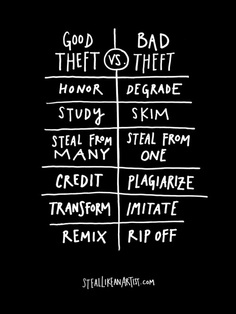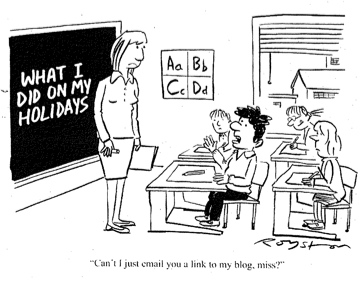Considering the extent that social networking facilitates the spread and misuse of others’ work

Stealing another person’s original content is an ever-increasing issue, as many people continue to publish and post content that is not their own, and fail to credit the original author. Perfect examples of this can be seen everyday on Twitter, whereby users take other peoples Twitter updates and re-post them as their own (distinct from retweeting). You will also find blog posts that are plagiarised too – sometimes with a few words changed around so the article is ‘spun’ – and others which are just blatant ‘scraping’ of the original article.
So why is it that plagiarism is making its way into social networks, and what can be done to stop it?
Lack of credibility
In the past, writers and celebrities were the only individuals who could get their content into the newspapers. One of the main reasons for this is that their identity, and/or the entity they wrote for carried a lot of credibility and both parties had a reputation as not only credible, but also reliable and believable.
Yet, with social networking, everyone has the possibility to be heard and discovered by lots of other people across the Internet. All they have to do is register on one of the countless sites that enable social media, like Facebook or Twitter, and they can commence chatting instantly and conveniently from the comfort of their own home.
Social networking allows millions of people all over the world to present their opinions, ideas and concepts on anything they want, whenever they want. But there can be a lack of believability if the user is not viewed as a professional or expert in that particular subject they are writing about.
Most may feel that taking and using the words from somebody who’s not an expert is not deemed as plagiarism, or they may even be reluctant to quote that individual because of their insufficient experience. However, regardless of experience, if somebody is worth quoting then they’re worth citing!

Having found the work of one its top posters to be riddled with plagiarism, popular social site BuzzFeed fired its political editor Benny Johnson in July 2014. In an online apology to its readers, BuzzFeed’s editor Ben Smith wrote: “This plagiarism is a breach of our fundamental responsibility to be honest with you … We are deeply embarrassed and sorry to have misled you.”
During an internal review it was found that there were at least 41 instances of Johnson lifting “sentences or phrases copied word for word from other sites”.

The type of communication through social networking
Now and again, content, images and videos occasionally go viral on the Internet. Appealing information like this can be so popular that literally thousands and even millions of people view and share this content.
On websites like Twitter, where the correspondence is intended to be short and fast paced anyway, viral tweets sometimes start off as accredited to the initial individual and somewhere along the way they lose it. Is this for lack of time or space?
But at the end of the day, when retweeting only requires a simple click of a button, does anyone really have the time to credit the original author? And how many people would bother even if it was a simple process?
The nature of social networking also requires a somewhat relaxed style of communication. Generally, lots of people see citing text as formal and something you conduct for your research paper, but not a process you carry out when developing an article or that 150 character tweet. So clearly there is a general consensus that giving proper credit to someone’s original content is just not needed through social networking, and is only worth doing if you are studying at University, or working for a newspaper.
But is this ethical, and is this way of thinking correct?
Zero accountability

As a whole, when written content is taken from social networking, there is hardly any obligation. There are no proper functions that scan for plagiarism or for whether text has been cited properly.
Internet organisations, like Google, know how critical legitimate information is, and it is well known that a website that has copied material is penalized with a drop in rankings on Google’s search page. In other words, if you have a website that posts content that has been taken from someone else on the Internet, then Google recognises that this has been duplicated and puts you lower down on the list when someone is searching for you.
Uncovering a way to penalize plagiarism in social media may not be as simple, but it is necessary because with minimal accountability many internet users will push the limits of what is ethical.
Perhaps the greatest consequence of plagiarism within social networking can be observed in Universities. It is within this location that not only scholars justify plagiarism, but scholars appear to have disregarded in some cases that their content and what they write must be original. How are we required to hold to a criterion when students and journalistic writers cannot uphold a level of no plagiarism themselves?
You must make your own choice

At the end of the day, those afraid of the value of their content within the context of social media can look for ways to take this into their own hands.
There are fantastic applications on the Web, such as www.plagiarismchecker.net , which can aid in checking social media posts for plagiarism. Copyscape is also a popular choice when checking for your content being lifted from the web.
Concerned users of social networking can also ensure that they give recognition where it is expected regardless of how much time that’s required, and in spite of the formality it forces on other people.


